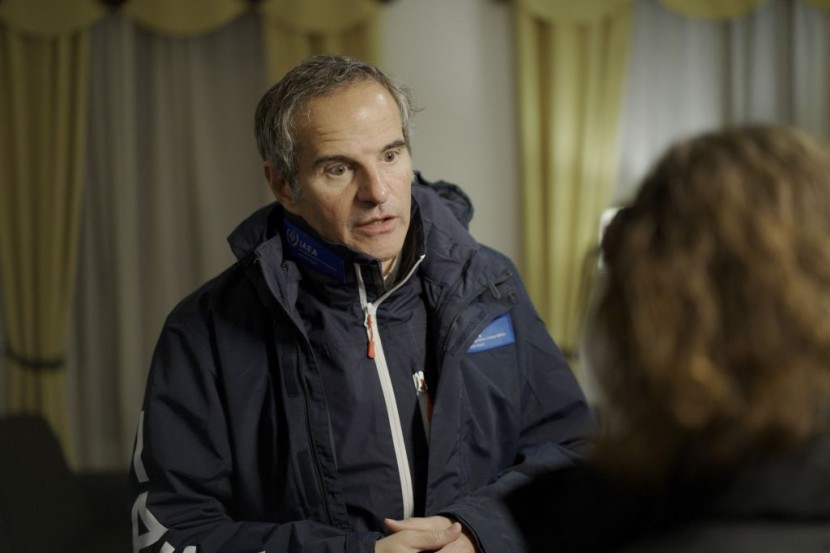
The UN nuclear chief emphasized the world's good fortune that a nuclear accident has not occurred in Ukraine and urged Moscow and Kyiv to commit to preventing any attack on Europe's largest nuclear power plant.
Rafael Grossi reiterated to the United Nations Security Council what he said in March to the board of governors of the International Atomic Energy Agency: "We are tossing the dice, and if this persists, one day our luck will run out."
UN Nuclear Chief Warns Russia, Ukraine Over Missile Attacks
The IAEA director general stated that avoiding a nuclear accident is possible if five principles are adhered to at the Zaporizhzhia nuclear power facility, where conflict has disrupted critical power supplies seven times, most recently last week.
Grossi "respectfully and solemnly" urged Ukraine and Russia to observe the principles, stating that IAEA experts will begin monitoring Zaporizhzhia and that he will report publicly on any violations, according to SFGate.
Since Russian forces commandeered Europe's largest nuclear power facility in Ukraine's Zaporizhzhia region over a year ago during Moscow's conflict with its neighbor, its safety has been a concern. It has been subjected to frequent bombardment, which has resulted in several power disruptions necessary for cooling the reactors.
In anticipation of a Ukraine counteroffensive, concerns have grown that a nuclear catastrophe could occur amidst heightened military activity. After months of negotiations, Grossi briefed the United Nations Security Council in New York on his proposals to assure the facility's safety, per Barrons.
Grossi emphasized that all structures and components essential to the safe and secure operation of the plant "should be protected from attacks or acts of sabotage." Grossi, who visited the plant in March, added that the IAEA intends to begin monitoring the principles on-site.
Per Aljazeera, he urged both parties to adhere to five safeguarding principles for the power plant, implying that he had yet to secure their agreement on the matter.
As one of the five principles, the IAEA chief urged that the plant not be used as a base for heavy weapons, such as multiple rocket launchers, artillery systems, munitions, and tanks, or for military personnel that could be used to initiate an attack from the plant.
His five principles also stipulated that neither the plant nor its environment should be attacked. Grossi has spent months attempting to reach an agreement to reduce the risk of a catastrophic nuclear catastrophe resulting from military activity, such as shelling, at Europe's largest nuclear power facility, which is located in Ukraine and has been occupied by Russia for over a year.
Before September, Zaporizhzhia supplied approximately 20% of Ukraine's electricity and continued functioning during the early months of Russia's offensive despite frequent bombardment.
Read Also : Japan Prime Minister Fumio Kishida Orders Son To Resign After Public Outrage Over 'Inappropriate' Behavior
Zaporizhzhia Crisis
Grossi demanded in a briefing to the UN Security Council that the plant's off-site power supply remain available and secure, that all of its essential systems be shielded from attack or subversion, and that no action undermine these principles.
The Russian and Ukrainian envoys at the United Nations each accused the other's country of the crisis in Zaporizhzhia, despite not rejecting the IAEA's principles. Vassily Nebenzia, Russia's UN ambassador, accused Kyiv and its Western allies of posing "threats" to the safety of the nuclear power plant.
Ambassador Sergiy Kyslytsya of Ukraine stated, "We take notice of the director general's principles to guarantee nuclear safety and security at Zaporizhzhia."
Kyslytsya desired a "complete demilitarization" of the territory surrounding the plant, but its efforts were unsuccessful. Grossi of the IAEA acknowledged the "distinct approaches" of the two parties. The crucial point, however, is that the minimum common denominator, which consists of these five fundamental principles, has received widespread support and no opposition.
Before September of last year, Zaporizhzhia supplied approximately 20% of Ukraine's electricity and continued functioning during the early months of Russia's offensive despite frequent bombardment. The facility remains connected to the Ukrainian power infrastructure for its purposes, including cooling the reactors, despite none of its six Soviet-era reactors generating electricity.
© 2026 HNGN, All rights reserved. Do not reproduce without permission.








